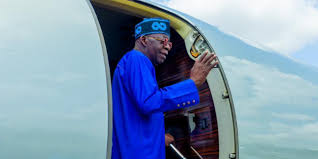The Presidency spent more than ₦23 billion in 2024 to purchase foreign currencies for international travels by top executive officials including President Bola Ahmed Tinubu, Vice President Kashim Shettima, and First Lady Oluremi Tinubu, according to verified data from GovSpend, a public finance tracking platform operated by BudgIT.
This marks a sharp increase of 23% compared to the ₦18.63 billion spent in 2023, underlining the growing cost of Nigeria’s diplomatic engagements abroad, particularly as the naira continues to depreciate against major global currencies.
The bulk of the 2024 expenditure came from international trips made by the President, whose diplomatic outings are said to be critical to Nigeria’s global standing. For example, ₦1.04bn was spent on the President’s trip to Ethiopia in February, while ₦1.27bn went into transit foreign exchange costs for the presidential air fleet in March alone. In April, an additional ₦5.07bn was allocated for the fleet’s operational expenses, bringing total costs linked to the President’s air travels to multi-billion-naira levels.
Also alarming is the State House’s total air travel bill in 2024, which ballooned to ₦7.83bn—a 344% increase from the ₦1.77bn recorded in 2023. A significant portion of this spending was awarded to Hinterland Travel & Tours Ltd, which received payments exceeding ₦158m, ₦167m, and ₦164m in just one month (March 2024). Other agencies like Travel Options Ltd and Overland Travels & Tours Ltd also received multi-million-naira contracts for similar services.
The Vice President’s travel bill was also substantial. In January 2024, ₦426.88m was spent on his trip to Switzerland, while ₦176.77m covered a separate trip to Côte d’Ivoire, bringing his total forex-related travel expenses to nearly ₦750m for the year.
The First Lady, Senator Oluremi Tinubu, was not left out, spending ₦149.79m on a January visit to France, and another ₦202.39m for a trip to Mozambique in March. Her cumulative foreign exchange expenditure for 2024 stood at over ₦478m.
Beyond direct presidential and vice-presidential travels, the Office of the Chief of Staff to the President spent ₦94.7m on foreign currency purchases to support logistical and diplomatic functions. This included ₦46.5m to support the President’s trip to the United Kingdom, and ₦12.7m for Nigeria’s participation at the 78th United Nations General Assembly.
A review of data also revealed that $1.274 billion was bought for 13 foreign exchange-related transactions. The largest was $1.271bn for President Tinubu’s trip to Dubai, UAE. Other large forex purchases included:
$483,277 for Vice President Shettima’s trip to Switzerland
$692,265 for the President’s trip to Ethiopia
$152,831 for the First Lady’s visit to France
$117,524 for Shettima’s trip to Côte d’Ivoire
$93,004 for Shettima’s trip to Liberia
$126,834 and $96,118 for the First Lady’s trips to Mozambique and Ethiopia respectively
$1.13m for estacodes related to UK and US training programmes
$79,740 for UNGA preparations
Importantly, the data only covers 13 out of 43 transactions, meaning the actual foreign currency expenditure could be significantly higher.
Critics have raised concerns about the rising cost of governance at a time when the country is facing high inflation, youth unemployment, and a fragile economy. The Socio-Economic Rights and Accountability Project (SERAP) condemned the spending spree, especially the disproportionate increase in recurrent expenditure versus capital investment.
Kolawole Oluwadare, SERAP’s Deputy Director, noted that the government is not aligning its spending priorities with the economic hardship most Nigerians face. “When you have a situation where recurrent expenditure is at 100%, but capital budget performance is just 25%, it shows a serious misalignment,” he said.
Experts and economists argue that while international diplomacy is essential, the scale, frequency, and cost of these foreign trips appear excessive—especially in light of the government’s repeated appeals for Nigerians to endure economic hardship and “tighten their belts.”
This raises the question of fiscal discipline and sustainability. Can Nigeria continue to fund expensive international engagements while capital projects stall and the naira continues to weaken? The rising forex demand for such travels adds further pressure on the country’s limited reserves, with implications for monetary policy and exchange rate stability.
Unless there is a reassessment of fiscal priorities, analysts warn that the government risks losing public trust and worsening Nigeria’s already fragile macroeconomic environment.
